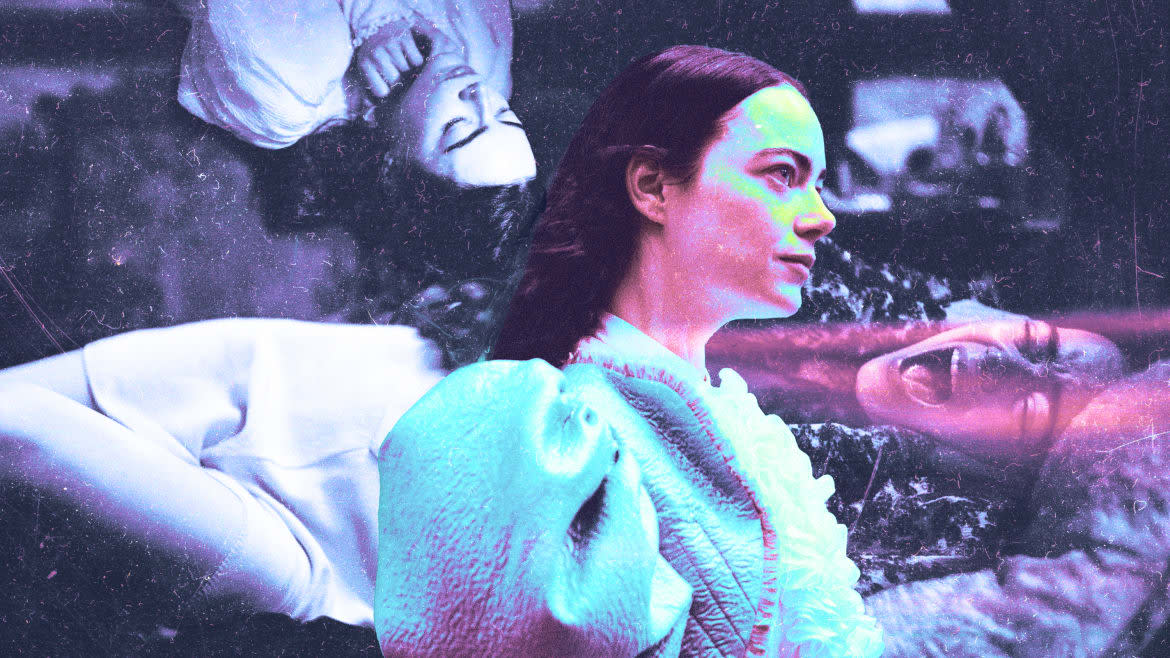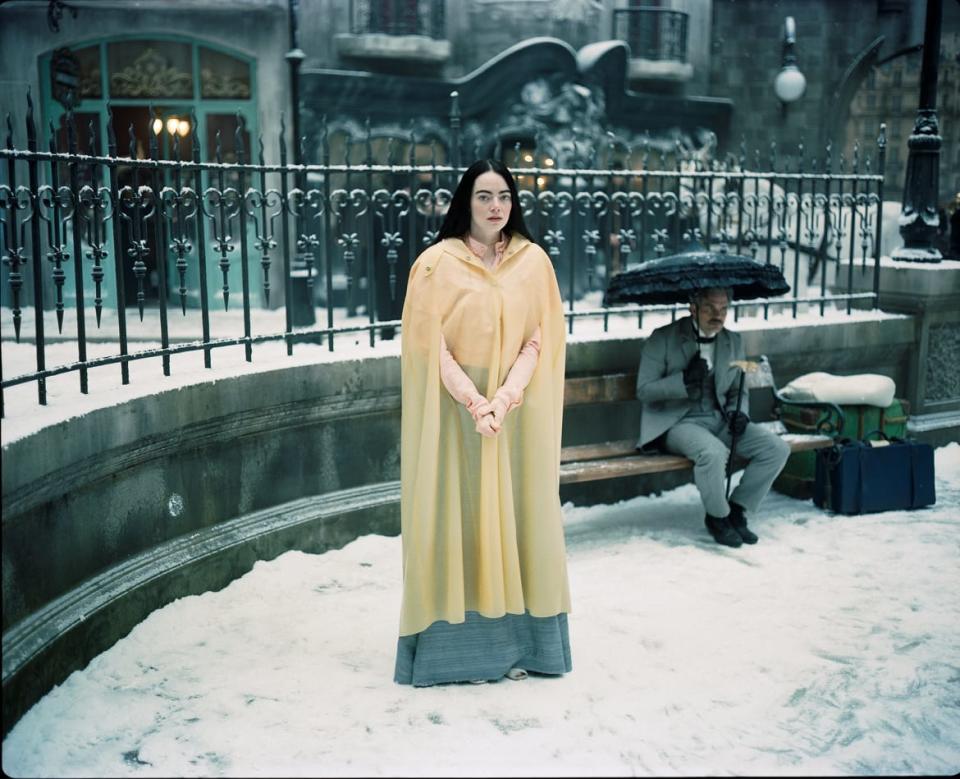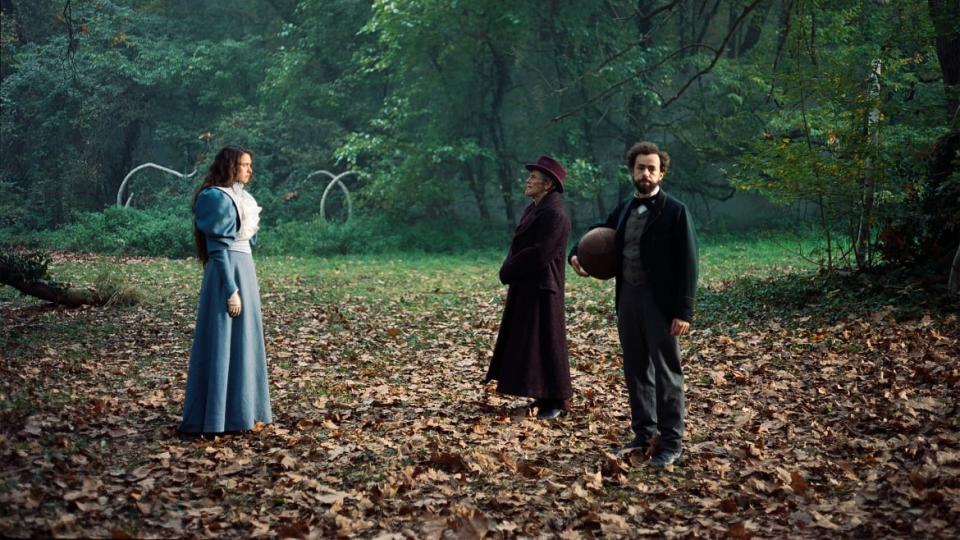Emma Stone Will Blow Your Mind in ‘Poor Things’

Poor Things is a work about distortion, assemblage, and invention, and it’s therefore apt that the film deforms and amalgamates to beget something thrillingly unique. Showing at this year’s New York Film Festival (ahead of its Dec. 8 theatrical debut), Greek auteur Yorgos Lanthimos’ latest is also a creation myth that heralds a new phase in the acclaimed director’s career, given that it’s his first feature to treat its characters not merely with bemusement and derision but, additionally, with respect and love.
A phantasmagoric and Bacchanalian odyssey of the mind, body and spirit, Poor Things—adapted from Alasdair Gray’s 1992 novel of the same name—is, in certain respects, easily identifiable as a Lanthimos effort. For one, it stars his The Favourite leading lady Emma Stone. Moreover, it concerns, at least at first, an unusual family unit residing in a more or less hermetically sealed environment. And it boasts the director’s warped directorial signatures, highlighted by his fondness for fisheye-lensed cinematography (here courtesy of The Favourite’s Robbie Ryan) that turns interior and exterior spaces unnaturally wide, rounded and dreamlike. That Lanthimos complements that flourish with recurring iris shots, low, upturned-angle images, sleek pans and pressing zooms further contributes to the action’s aberrant grandeur.
Flip-flopping between stark Murnau-grade monochrome and lush Sirk-ian technicolor, Lanthimos and Ryan’s visuals twist shapes, figures and perspectives, and their settings are likewise fantastically abnormal. Poor Things takes place in a steampunk past marked by opulently decorated mansions, spiraling staircases, and hyperbolic attire, and Lanthimos’ camera winds and twirls about these structures and people with unhinged curly-cue nimbleness. The result is a film that, from an aesthetic standpoint, resembles a florid, mad hybrid of all manner of disparate sources, from Time Bandits, Black Narcissus and Babe: Pig in the City to Amélie, Eraserhead, Nosferatu, and Alice in Wonderland.
Like Lewis Carroll’s heroine, Poor Things’ protagonist tumbles down a (figurative) rabbit hole on a journey of self-discovery, although in most other respects, Bella Baxter (Stone) is more akin to the child-bride of Frankenstein. Bella is a strange raven-haired bird who lives in a manor house with surgeon Dr. Godwin Baxter (Willem Dafoe), whom she calls “God” and whose scarred face and tales of suffering (at the hands of his brilliant and uncaring father) mark him as both scientist and monster. Godwin found Bella following her successful suicide attempt and brought her back to life Mary Shelley-style, albeit with a major variation: rather than just resurrecting her as her former self, he transplanted the brain of Bella’s unborn baby into her then-dead head before jolting her into existence. Consequently, she’s both infant and adult, mother and daughter—a closed-loop condition that’s echoed by the director’s curved compositions.

To study Bella, Godwin enlists the services of his surgical pupil Max McCandles (Ramy Youssef), who’s aghast at what his mentor has perpetrated and yet is quickly smitten with Bella. While initially a coordination-challenged, speech-impaired simpleton, Bella is no idiot; rather, she’s a creature in the nascent stages of development, and her first step toward maturation involves learning about sexual pleasure. Thanks to private and then very public experimentation, a hedonistic light goes on in Bella’s noggin. Despite agreeing to marry Max, she soon becomes intensely attracted to sleazy Duncan Wedderburn (Mark Ruffalo), a lothario lawyer who convinces her to flee her English prison for freedom and adventure.
Bella covets what Duncan promises and away they go, with Poor Things leaving behind the grotesqueries of Godwin’s macabre home for Lisbon and seductive ports beyond. It’s an expedition that commences with outrageous carnal profligacy (to Bella, sex is “furious jumping”), and Lanthimos stages Bella’s countless erotic romps with the same eccentric abandon that he brings to the rest of his material, in which Bella spits out food that she dislikes, discusses things that aren’t to be mentioned in polite company, and lets her whims carry her where they may. On a ship bound for Alexandria, she meets an elderly woman named Martha (Rainer Werner Fassbinder favorite Hanna Schygulla) and her traveling companion Harry (Jerrod Carmichael) and is introduced to modern philosophical ideas that allow her to begin the slow transition from a creature of instinct to one of thought.

Bella’s quest for agency takes her to the brothels of Paris and the home of her prior self’s husband Alfie (Christopher Abbott), with Tony McNamara’s incisive and laugh-out-loud script providing a bey of controlling male foils and systemic forces with which Bella must contend. Poor Things is an episodic saga of feminist empowerment that moves from one hilariously bizarre scenario to another, each one rife with fanciful physical, conversational and narrative idiosyncrasies. Everything in Lanthimos’ make-believe cine-playground is stretched and bow-tied in weird and wonderful ways, and Jerskin Fendrix’s score is similarly elastic, operating in so many diverse registers—sharp and suspenseful strings, low and terrifying tones, playful and flighty flutes—that the film feels like it’s in a constant state of metamorphosis.
Poor Things’ plot never stops wildly reconfiguring its influences, including Candide, with Bella’s trip through the world, and encounters with life’s harsh realities, shattering her innocent illusions—as well as stimulating her hunger for enlightenment and contentment on her own terms, damn the demands of men and their self-serving society. Godwin, Duncan, Max and Alfie have unhelpful and/or objectional designs for what Bella is, should, and must be, and Lanthimos casts them as exaggerated comic characters standing in the way of Bella’s growth. Ruffalo in particular is a riot, making an absolute mockery of Duncan, who pretends he’s a champion of uninhibited liberation but eventually reveals himself to be a conventional sort of high-handed chauvinist.
‘Poor Things’: Emma Stone’s Wild Sexual Fantasia Is Now the Oscar Frontrunner
For all Poor Things’ imaginatively perverse, pillow-soft embroidery, nothing overshadows Stone’s odd, amusing and affecting performance as Bella, a beautiful beast who’s equal parts enchanting and—to those who expect her to conform to misogynistic standards—threatening.
Whether in the nude or wearing one of her colorfully opulent outfits, many of them pairing puffy shouldered coats and robes with short skirts and pants, Stone embodies Bella as a living, breathing perpetual mutation machine. From struggling to articulate basic concepts to eloquently expressing her opinions and desires, and from awkwardly stumbling about like Boris Karloff to confidently navigating the myriad treacherous spaces in which she finds herself, Bella proves a virtuous young woman in the process of understanding, and embracing, her power.

Distortions are everywhere in Poor Things, but ultimately, its greatest alteration has to do with its author. Devoid of the wry detachment that’s typified much of his preceding output, Lanthimos’ whimsical and wonderful comic drama radiates sincere and effusive affection for Bella. Ridiculing her compatriots and oppressors while refusing to reduce her to a joke, it becomes, by its conclusion, a celebration of triumphant feminist autonomy—and, as such, a leap forward in its deliriously demented director’s own evolution.
Liked this review? Sign up to get our weekly See Skip newsletter every Tuesday and find out what new shows and movies are worth watching, and which aren’t.
Get the Daily Beast's biggest scoops and scandals delivered right to your inbox. Sign up now.
Stay informed and gain unlimited access to the Daily Beast's unmatched reporting. Subscribe now.

 Yahoo News
Yahoo News 
